#traffic
Law Review Blasts Toll Road, Parking Meter Privatization
A University of Chicago Law School professor is challenging the prevailing wisdom regarding the sorts of transportation privatization deals that have grown increasingly popular. The Minnesota Law Review last month published a critique by Julie A. Roin that argued such deals have more in common with the medieval practice of tax farming than true privatization. She cited as a primary example Chicago, Illinois Mayor Richard M. Daley’s 2008, lease of the city’s parking meters to Morgan Stanley for 75 years in return for an up-front payment of $1.2 billion.
"The agreement exchanges future public revenues for present public funds, just like debt," Roin explained. "And just like many debt arrangements, the parking meter deal will leave future ratepayers decidedly worse off… Future ratepayers will be doubly disfavored relative to current residents: they will have to pay higher taxes to maintain the same level of services, even as their disposable income is reduced by the extra parking fees mandated by the agreement."
Texas Appeals Court Upholds License Scanners for Traffic Stops
Police in Texas have the right to stop motorists if a license plate recognition camera system suspects the vehicle’s owner lacks automobile insurance. In an unpublished ruling last Wednesday, a three-judge panel of the Texas Court of Appeals refused the attempt by Kenneth Ray Short to have a March 2010 traffic stop declared illegal.
Houston, Texas Mayor Flip Flops on Red Light Cameras
Another twist in the red light camera saga in Houston, Texas could leave photo enforcement vendor American Traffic Solutions (ATS) out in the cold. Later today US District Court Judge Lynn N. Hughes is expected to decide whether to grant ATS a restraining order that would prevent America’s fourth largest city from deactivating its automated ticketing machines. Voters in November enacted a charter amendment prohibiting camera use, but Hughes personally decided to overturn their ballot choice saying the voters just “want to run red lights.”
That ruling has not gone over well with the public, and Mayor Annise Parker has been feeling the heat from members of the public and the city council. Late last week Parker reversed course and scheduled a vote this Wednesday that will allow the council decide how to proceed on the issue. The sudden shift left ATS furious.
Texas Appeals Court: Driver Has No Right to Dashcam Video
Drivers have no recourse if police say the tape from a dashboard-mounted video camera is not available, according to a ruling Wednesday from the Texas Court of Appeals. Mark Lee Martin wanted to defend himself against drug possession charges filed in the wake of an August 29, 2008 traffic stop, but he was told no video was available.
Travis County Sheriff’s Deputy Darren Jennings claimed that he pulled over Martin that evening because he failed to signal a left-hand turn. Within less than two weeks after the incident, Martin’s attorney formally requested that the department preserve video evidence from the stop. Subpoenas were issued to ensure “all videos and dispatch calls” would be saved. At trial, Jennings was asked why the camera evidence had not been kept.
“Since I didn’t put it in my report it wasn’t preserved because I didn’t believe it had any type of evidential value,” Jennings told the court.
Tennessee Attorney General Backs Right Turn Camera Ticket Ban
The Tennessee General Assembly is free to impose limitations on the use of automated ticketing machines, according to an opinion issued Monday by Attorney General Robert E. Cooper Jr. Cities and photo enforcement companies had complained that the legislature had “impaired contracts” when it enacted a law in July prohibiting the issuance of photo tickets to drivers making slow right turns on red. Right-turn citations have become the primary moneymaker for red light camera systems nationwide.
More Ohio Cities to Hold Anti-Traffic Camera Votes
In the past five years, five Ohio cities have voted to ban photo enforcement, and two more might be added to the list. The Cuyahoga County Board Of Elections is now counting signatures from residents in South Euclid and East Cleveland who are determined to prohibit automated ticketing in November. On August 3, organizers in East Cleveland handed in 1624 signatures, well more than the 358 needed to qualify in the city of 18,000. South Euclid activists turned in 1076 signatures on July 25.
Australia: Speed Camera Deployments Examined
The auditor general for New South Wales, Australia last month issued a report on speed camera use in the state. The Liberal Party government had ordered the review after it took power at the end of March. Following the results, thirty-eight camera locations have been taken offline.
As with the like-minded Conservative Party in the UK, NSW Liberals did not set out not to end the use of photo enforcement which generated 371,015 tickets worth $58,117,038 last year. Instead, the party’s leaders are taking steps reduce the number of cameras and reverse the ruling Labor Party policies that kept safety, operational and revenue data for individual cameras a closely guarded secret. No effort had been made to evaluate the program since 2005.
Washington: Traffic Camera Executive Orchestrated Anti-Voter Suit
Photo enforcement vendor American Traffic Solutions (ATS) could find itself in trouble for lying before the Washington Supreme Court about its involvement in attempts to overturn a ballot initiative in Mukilteo last year. The Everett Herald newspaper obtained emails from former ATS Vice President Bill Kroske that show he attempted to collude with the city’s mayor to deny the public an opportunity to vote on banning red light cameras and speed cameras.
Desperate Photo Enforcement Firms Sue Cities
Companies that operate red light cameras and speed cameras are facing increasing opposition across the country. In response, the firms have adopted a strategy of suing cities that have second thoughts about continuing to use cameras in their community. They have also been going after their own customers to collect as much revenue as possible.
On December 1, Redflex filed suit against Tempe, Arizona in Maricopa county Superior Court claiming the city owed $1.3 million in per-ticket fees for each driver mailed a photo ticket who decided to go to traffic school. The city claims it only collected $1.8 million in revenue from the program, mostly because last year’s payment rate was just 31 percent. Drivers realize in increasing numbers that tickets in the state can be ignored unless they are properly served.
Ask The Best And Brightest: Should Trucks Be Limited To The Right Lane?
As a telecommuter, I don’t drive as much as many Americans do, but I’ve come to the conclusion that lane discipline in this country (or at least in my part of it) is a huge problem. Traffic is frustrating in all circumstances, but unnecessary congestion caused by drivers who act without any apparent awareness of traffic around them is by far the most frustrating. And, in many cases, unnecessary congestion is caused by light-duty vehicles being held up by trucks, or slow-moving traffic clogging the left lane because of trucks passing in the middle lane.
Jalopnik takes on the issue of trucks in traffic with a piece entitled What you don’t know about the truck driver you just flipped off, which argues that truckers are overworked, overregulated and under financial pressure to deliver quickly. And though I sympathize with the plight of long-haul truckers, I don’t believe they should be allowed to leave the right lane.
Chicago School Crossing Guards To Write Parking Tickets
[Ed: This piece originally appeared at The Expired Meter]
Every morning, children who walk to school are familiar with the smiling, friendly faces and the outstretched arms of their local crossing guard who ensures they get safely to class each day during the school year.
But what do crossing guards do when school’s out for summer?
At least some of the friendly faced school crossing guards are spending their summer vacation writing parking tickets to Chicago drivers on behalf of the city.
It began as a pilot program last summer, and as a way to give crossing guards a way to continue to bring in a paycheck when school was finished in June, according to Crossing Guard Coordinator John Maciezjewski, a retired police officer. This year it has been rolled out city wide to give summer employment opportunities to the over 1100 crossing guards working for the city.
Federal Court OKs Personal Information on Parking Tickets
The Village of Palatine, Illinois prints the personal information of vehicle owners — including their address, driver’s license number, date-of-birth and weight — on parking tickets left under the windshield wipers of their automobiles. In a ruling handed down last month, the Seventh US Circuit Court of Appeals found no problem with this procedure.
Motorist Jason Senne had filed suit against what he saw as an outrageous violation of privacy after he received a $20 parking ticket in August 2010. The information printed on the citation, and left open to anyone walking past his vehicle, could be used by an identity thief. Senne argued this was a violation of the federal Driver’s Privacy Protection Act which prohibits disclosure or otherwise making available the information found in motor vehicle records.
Washington: Anti-Camera Referendum Sponsors Fight Back
Backers of ballot initiatives that would ban photo enforcement in a number of cities in Washington state are fighting back against municipal efforts to silence their vote. Traffic camera companies have become increasingly bold in their efforts to prevent the public from deciding whether red light cameras and speed cameras should be used in any given community.
American Traffic Solutions (ATS) scored its first victory in May when it found an activist judge in Chelan County willing to block residents from even filing a petition to their government regarding the use of traffic cameras in the community ( read decision). Just days after the decision came down, the state supreme court discussed traffic camera initiatives, and several justices pointed out that blocking signature collection efforts would be a violation of the state constitution. Nonetheless, to bypass the legal blockade, initiative co-sponsor Matt Erickson is circulating a second petition that schedules an advisory vote on taking down the cameras at every election until the devices are finally removed.
Los Angeles, California Red Light Camera Program Officially Canceled
Red light cameras are coming down in Los Angeles, California after midnight on Sunday. The city council yesterday voted unanimously to drop the program primarily over the county court system’s refusal to enforce unpaid tickets, depriving the city of millions in expected revenue. The council instructed the city attorney to work with American Traffic Solutions (ATS) to decide the cheapest way to remove the systems and process all tickets issued through the end of the month.
“We need to be clear about what we are doing here today with this particular vote,” Councilman Dennis P. Zine said. “I don’t want to give the wrong perception to the public that this program may continue in the future. As I noted, photo red light will be gone in four days. Cameras need to come down immediately to not create a smokescreen to affect the hope that we may turn them back on.”
Los Angeles Red Light Cameras Die On Sunday; If You Have A Ticket, You Might Want To Ignore It
The LA Times reports:
The City Council voted unanimously Wednesday to halt Los Angeles’ controversial red-light camera program, which has ticketed more than 180,000 motorists since beginning in 2004. The program will officially end July 31.
The action followed a similar vote last month by the city Police Commission, which sought to drop the 32-camera program in part because of the difficulty in collecting fines.
But wait, the news gets better! Earlier today, the LAT helped bust the photo enforcement program wide open, reporting:
City officials this week spotlighted a surprising revelation involving red-light camera tickets: Authorities cannot force violators who simply don’t respond to pay them. For a variety of reasons, including the way the law was written, Los Angeles officials say the fines for ticketed motorists are essentially “voluntary” and there are virtually no tangible consequences for those who refuse to pay.
It’s a little more complicated than that, but those are the broad strokes.




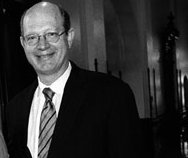

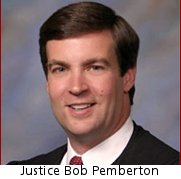
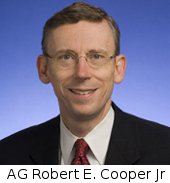

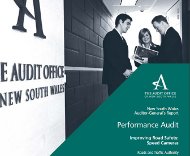




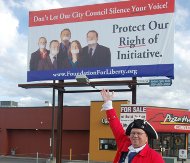
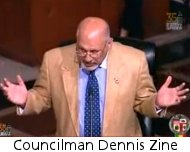
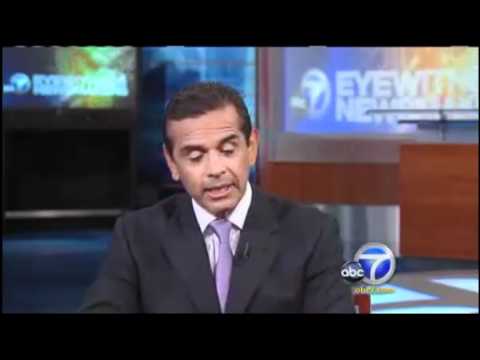












Recent Comments